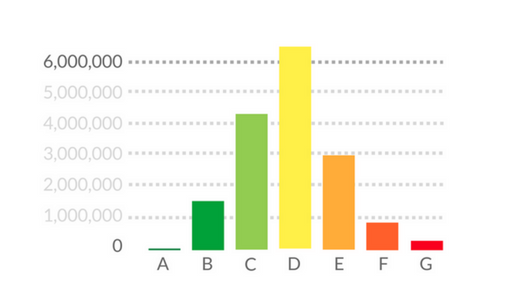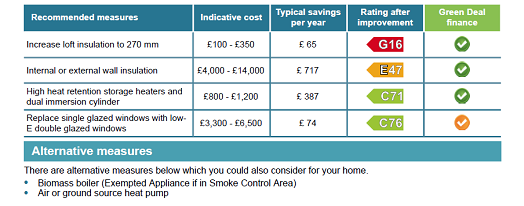What are the EPC changes?
Since 1st April 2020, landlords are unable to create new tenancies in England and Wales without an EPC rating of E or above.
Over one million dwellings might not pass the new rules, and landlords could be facing huge fines.
Read on to find out everything you need to know about the most recent EPC rules.
Need to order your EPC?
We’ve teamed up with the best energy assessors up and down the UK to bring you great service for an incredible price. Book Your EPC Now
How long does an EPC last?
Landlords need to get a new Energy Performance Certificate (EPC) certificate every ten years.
What rating do you need for a rental?
Each certificate has a grade from A to G, rating the building’s energy efficiency.
Since April 2018, both domestic and non-domestic properties in England and Wales have had to meet a minimum energy efficiency standard (MEES) which is set at an E rating for all types of domestic and non-domestic property.

Which properties do the rules apply to?
- Domestic properties in the private rental sector
- On a lease between 6 months and 99 years
- In England and Wales.
- (Scotland has similar legislation in place already)
Without an EPC rated E or above, landlords face civil and criminal penalties for signing a new tenancy, or renewing an existing tenancy, from 1st April 2018. There are fines of up to £5,000 per property for landlords that are found in breach of the legislation.
Do I need an EPC for an existing tenancy?
Yes. When the rules were first introduced they did only apply to new tenancies.
However, on 1st April 2020, the new MEES rules expanded to all existing lets. Since then, an EPC rating of an E or above is required to let your property at all.
Even if your tenancy is already underway and you have no plans to renew, you need to have an EPC rating of E or above or you could face fines.
What should I do If my rental property has an EPC that is lower than an E rating?
If your last EPC rating was below an E, the first thing to do is to get an up-to-date EPC carried out. You can order a comprehensive EPC report with OpenRent.
EPC calculations are changing all the time and it is possible that you will receive a different rating to the one you got several years ago. If the property’s new EPC rating is still below an E, then you will need to make efficiency improvements to boost your rating before you let it out or renew your contract.
Your EPC report will have a list of recommended measures for improving your property’s energy efficiency performance. You will need to carry out enough of these measures to improve your score to above an E rating.
The recommendations in the table are cumulative. In other words, the rating in the ‘Rating After Improvement’ column shows you what the rating would be if you carried out that improvement and all the improvements above it in the table.
Speak to your EPC assessor if you are unsure about how to proceed with improvements.
After the energy efficiency changes have been made to the property, you will then need to get another EPC to show the new energy rating.
When is an EPC not required?
In England and Wales, there are over one million domestic buildings with an EPC rating of F or G – that’s around 6% of properties.
There are some exceptions as to which properties must comply with the new regulations. These will only apply in a small number of cases. If one of these apply, you can register for an exemption on the PRS Exemptions Register.
- Devaluation: The required improvements will either cause damage or reduce the value of the property by 5% or more.
- Consent: It is not possible to gain the consent for the works to be completed required from the tenant, lender or superior landlord.
- Cost: The identified improvement measures are not cost-effective, either within a seven year payback, or under the Green Deal’s Golden Rule.
Get help on the phone
You can call the government-backed Simple Energy Advice service on 0800 444202 for advice and information about what support is available in your area, and whether you would qualify for any financial assistance in making efficiency improvements.





Start the discussion at community.openrent.co.uk